
Ah, Venezia! City of romance, of gondola rides in the arms of a beloved, of moonlight serenades, of roses adrift upon the canal. A place of mystery and beauty, of magic and dreams.
But first, we had to get there.
Our night train arrived in Milan with the morning, which hadn't come fast enough now that I had spent two sleepless nights. We disembarked, stale and bleary, intending to search for breakfast, and found ourselves accosted by Milan's train station. Huge and oppressive, it towers over the lowly pedestrian, declaiming "You are small and insignificant. You are a piece of the great machine. You are replaceable." We made do with a couple of imitation Egg McMuffins and awaited our departure time onboard. I prayed we would be permitted to leave, unquestioned by the winged heads and angular stone giants.
|
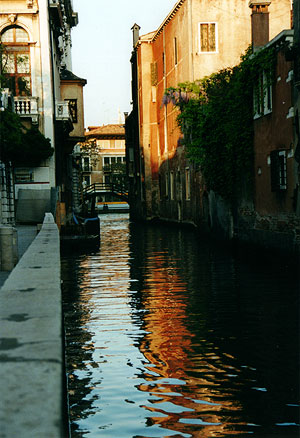
Ian spent most of the train ride on the cellphone, (Free advice: never travel Europe without one.) calling each hotel listed in our guide books to ask "Avete una camera per stasera?" No, no, tomorrow, no, sorry, no, not until next week. I tried not to think about the possibility of another night train.
And then Fate smiled. It was expensive and on a tourist thoroughfare and only available tonight, but there was a cancellation at Hotel Zecchini (forever remembered as The Zucchini). Our room looked over the noisy street, and the day was already too warm to keep the windows closed. It didn't matter. Given a real bed and the first shower in two days, it is amazing what a person can sleep through.
And it is amazing what a little sleep will do for one's outlook. The nap had been brief, but I was feeling much better about our "aimlessly-wander-about-Europe" plan; maybe we weren't entirely crazy after all. The afternoon light, gorgeous and golden, only made things look better as we merged with the constant flow of tourists following pre-determined routes to Venice's sights. Most visitors, we discovered, never deviate from these paths. A river of people winds slowly through Venice, speaking a dozen languages and carrying its weight in cameras.
We, on the other hand, abandoned the stream of tourists at the first opportunity with every intention of getting as lost as possible. Venezia is an island city, after all, and the map is smaller than your average sheet of paper. Even at the most disoriented, you are never far from either a landmark or the river of tourists. Sure, we would make all the necessary visits to the places you must see when in Venice...
|
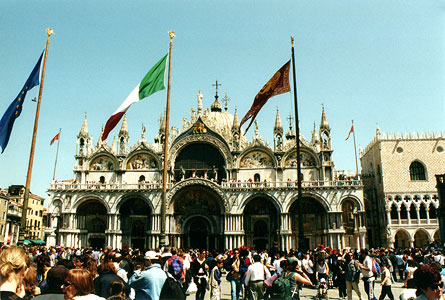
... the glittering Basilica di San Marco and the grand Piazza, where we would count winged lions and watch giddy parents pour birdseed over their children, then take pictures of the resulting squirming mountain of feathers...
|
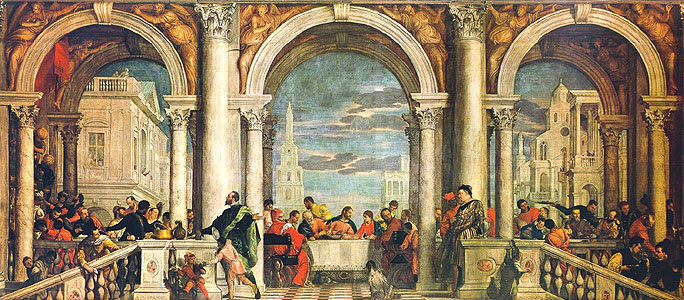
... and the Gallaria dell'Accademia and the neighboring church, Santa Maria Gloriosa Dei Frari, to absorb the vibrant realism of Venetian Renaissance art.
|
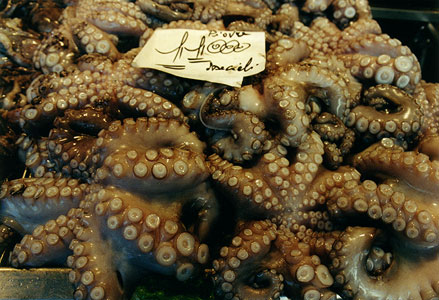
But by stepping off the designated path, we would also explore the hidden parts of Venice, the parts most tourists wouldn't find. We would wander through the open-air fish market, inhaling the wet sea smell and hearing the banter of merchants.
|
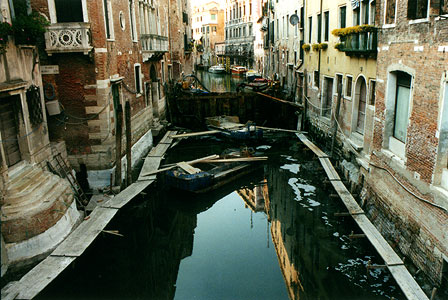
We would see the backstage construction, the modern solutions which permit the Renaissance façades of Venice to defy the ravages of Time, to remain above sea-level, a destination for the river of tourists...
|
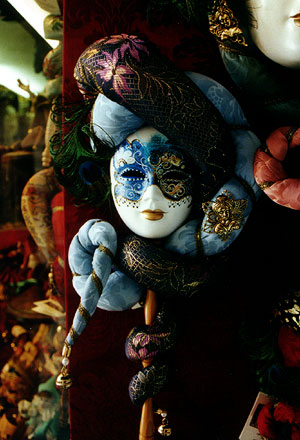
For it is the tourists who keep Venice afloat. The wealth reaped in the Middle Ages, when the city was the mid-point of the East/West trade routes, has long since disappeared, spent freely in two centuries of decadence. The memories of that extravagance linger along the canals, echoes of music and laughter and rustling silk, and it is this memory which the tourists come to see. The city does not disappoint; Venice has carefully arranged her faded glory to give you that Renaissance feeling, for a price. Windows of carnival masks and delicate glassware, of painters' easels and handbound books whisper of a time of refinery and grace, of elegant people and sophisticated entertainments.
|
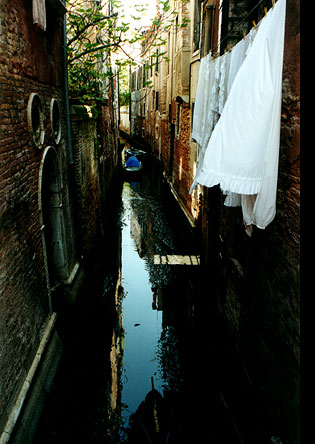
It is impossible to be in Venice and not be aware of her history. She wears it on her sleeve, the years of wealth and power, the years of extravagance, the years of decline and neglect. But if you go deeper than the marble palaces and gold mosaics, you discover Venice today is not just a museum nor an amusement park. Just around the corner from the tourist parade, there are quiet lanes, mazes of streets and canals, narrow arched bridges, and alleys which suddenly drop off into water. Ordinary people still make their lives here. The plaster may be crumbling to reveal the brickwork underneath, acid rain may be streaking the marble black, the grand palaces may be sinking into the sea, but Venice still has permanent residents who have groceries to buy and laundry to hang.
We spent two days wandering the backstreets of Venezia, exploring narrow streets to abruptly arrive at someone's front door, climbing forgotten staircases made fuzzy with new grass. Our camera chewed through every roll of film we had with us, and still we found corners of neglected beauty, light and water and elegant decay. This was not a trip backward in time but a behind-the-scenes tour of a fantasy, the substance for a fairytale promising love and adventure, a story little girls might tell themselves while drifting toward sleep.
|
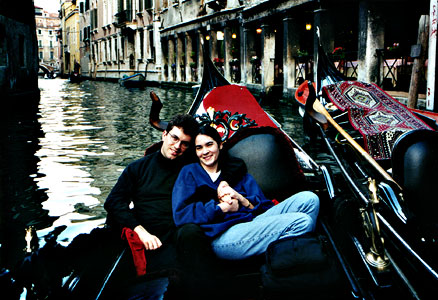
Venice is a drug, and she is addictive. When it is time to move on, she lures you back, bending the streets away from the train station. There are still things to see, and, even more, there are things to experience. She makes promises she cannot keep, tempting you to stay, to enjoy the Venetian good life. And you find yourself believing her, despite the impossibility. Why shouldn't I stay? The costumes, the parties, the wine and the people. With Venezia for my muse, I could be a real writer.
I suppose we'll never know why she let us go, why the streets eventually uncrooked themselves to reveal the station. Maybe she took pity, aware that prior reservations had bumped us from our second hotel. Or maybe she knew we'll be coming back someday.
|

